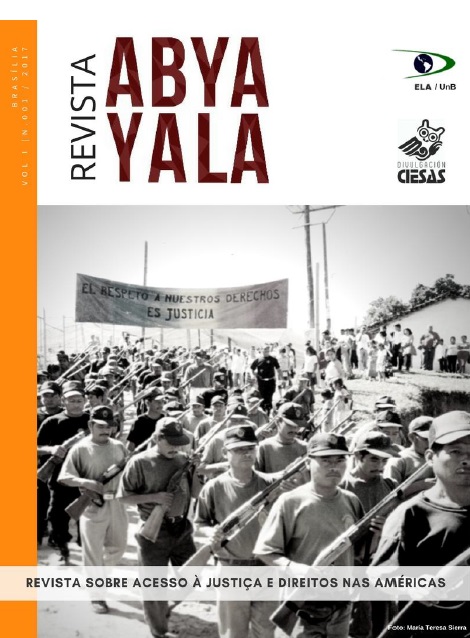The "Sertão" Canal: transposition of indigenous territories - socioeconomic effects on the Karuazu People.
Keywords:
Indigenous populations, Karuazu, territory, Canal do Sertão, Socioeconomic factorsAbstract
The present work analyzes the construction of the Sertão Canal over the Geripankó, Katökinn and Karuazu indigenous territories, in the Alto Sertão region of Alagoas, in the municipality of Pariconha. The project aims to capture water in the São Francisco River and supply the majority of the population of Sertão and Agreste of Alagoas. The study studied the socioeconomic impacts on the Karuazu people, with about 300 families living in the communities of Tanque and Campinhos, since the work directly affects all the territorial extension claimed since the year 2000 by this indigenous population. In view of the social and economic conditions of the regional semi-arid region, the population is penalized and obliged every year to move seasonally to work on sugarcane cultivation in the Mata region of the State of Alagoas. With this reality and aiming to demobilize the demonstrations, the contractors hired the indigenous to perform the preliminary tasks, replacing it later by external labor. The work left, as immediate consequences, the unemployed indigenous workers and forced to move to Southeast Brazil in search of work fronts; The process of demarcation of the paralyzed territory; And, with the valorization of the land, aroused real estate speculation and strengthened agribusiness in the region; Internally, communities were weakened by social disintegration and economic precariousness. With all this, the development policy of the Federal government failed to fulfill the constitutional rights of indigenous peoples, especially the demarcation of Karuazu territory. Finally, the article analyzes the process of indigenous resistance and the action of the Brazilian State, the socioenvironmental impacts in the indigenous territories and the absence of prior, free and informed consultation of the indigenous peoples directly affected.
Downloads
References
ALBUQUERQUE, Clóvis Antunes Carneiro de. Índios de Alagoas – Documentário. Maceió, 1984.
ALTAVILA, Jayme. História da Civilização das Alagoas. Maceió: Edufal, 1988.
AZCONA, Jesus. Antropologia II - A cultura. Trad. de Lúcia MathildeEndlich Orth, Petrópolis: Vozes, 1993.
BRAND, Antônio. Biodiversidade, Sócio-diversidade e Desenvolvimento: os Kaiowá e Guarani no Estado de Mato Grosso do Sul. In: COSTA, R. B. (org.). Fragmentação Florestal e Alternativa de Desenvolvimento Rural na Região Centro-Oeste. Campo Grande: UCDB, 2003.
CONSTITUIÇÃO DA REPÚBLICA FEDERATIVA DO BRASIL, 1988.
HERBERTTA, Alexandre Ferraz. Peles braiadas: modos de ser Kalankó. Recife: Editora Massangana, 2013. GAZETA DE ALAGOAS, 2010, p. A17.
JÚNIOR, Aldemir Barros da Silva. Aldeando Sentidos – ao Xucuru-Kariri e o Serviço de Proteção aos Índios no Agreste Alagoano. Maceió: Edufal 2013, volume XV.
LEMOS, João R. Dom Fernandes Sardinha – Um bispo, Mártir, em Coruripe. Maceió, 2004.
OLIVEIRA, João Pacheco de. A Viagem da Volta – Etnicidade, política e reelaboração cultural no Nordeste indígena. 2ª ed. Rio de Janeiro: Contra Capa, 2004.
PEREIRA, Moacyr Soares. Índios Tupi-Guarani na Pré-História – suas invasões do Brasil e do Paraguai; seu destino após o descobrimento. Maceió: Edufal, 2000.
SILVA, Álvaro Queiroz da. Episódios da História das Alagoas. 3ª ed. Maceió: Gráfica Moura Ramos, 2010.
VIEIRA, Jorge Luiz Gonzaga. História Kalankó na memória de uma experiência indigenista: confinamento, diáspora e resistência étnica de um povo. IN: Índios de Alagoas: cotidiano, terra e poder. Vol. 11. Maceió: Edufal, 2009.
WEBER, Max. Economia e sociedade: fundamentos da sociologia compreensiva; tradução de Regis Barbosa e Karen E. Barbosa, 3ª edição, Brasília: UnB, 1994.
Downloads
Published
How to Cite
Issue
Section
License

This work is licensed under a Creative Commons Attribution-NonCommercial 4.0 International License.
The sending of contributions to Abya Yala implies the assignment of copyright and publication to the Journal, observing the Attribution-Non-Commercial 4.0 International (CC BY-NC 4.0) adopted.
The content of the texts submitted to and published by the journal will be the sole responsibility of their respective authors.
Copyright: https://creativecommons.org/licenses/by-nc/4.0/deed.en








